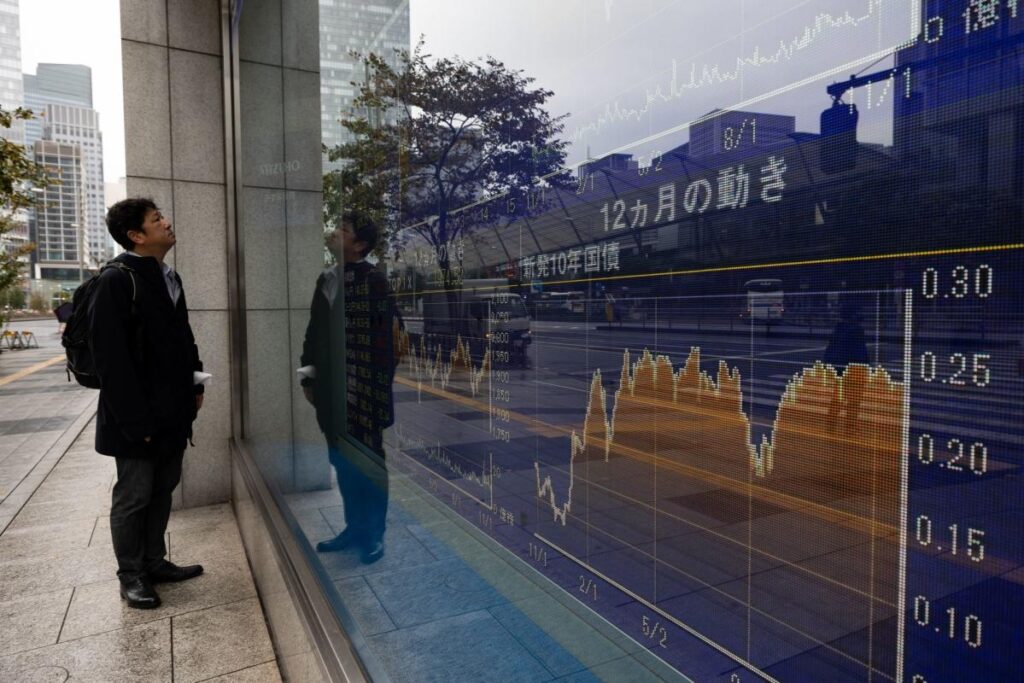(Bloomberg) — European stocks slipped as euro-area bond yields surged on Tuesday as hot inflation reports ramped up the stakes for the region’s central bank to battle rampant price pressures.
Most Read from Bloomberg
The Stoxx 600 fell 0.3%, trimming a 1.7% gain for February, in the wake of reports that showed accelerating inflation in France and Spain. US contracts were rangebound after a solid day of gains for the S&P 500 and tech-heavy Nasdaq 100 on Monday.
The yield on two-year German government bonds jumped as much as 9 basis points to 3.17%, the highest since 2008. Treasury yields advanced, with the 10-year benchmark climbing four basis points toward 4%.
The latest set of data are likely to harden the resolve of central banks to keep ratcheting up rates to defuse still-hot inflation and resilient economies. French inflation accelerated to a record in February, while Spanish inflation unexpectedly quickened in February on higher electricity and food cost, increasing pressure on the European Central Bank to deliver more interest-rate hikes.
For the first time, money markets fully priced in a 4% ECB terminal rate by February 2024. That compares to a 3.5% rate expected at the start of the year and would exceed the peak for euro-area interest rates seen more than two decades ago.
US data on Monday further outlined the challenge facing the central bank. Pending home sales increased in January by the most since June 2020. Durable goods orders fell, but after accounting for a drop in transportation equipment rose more than expected. Orders placed with factories for business equipment also rose.
Traders are now pricing US rates to peak at 5.4% this year, compared with about 5% just a month ago. Federal Reserve Governor Philip Jefferson firmly stood by the central bank’s 2% inflation goal on Monday. A series of hawkish Fed speak this month has trimmed January’s gains across markets.
Read More: Traders See US Economy as a Balloon Directed by Multiple Forces
Elsewhere, oil was set for a fourth straight monthly decline as concerns about tighter monetary policy and swelling stockpiles in the US eclipsed optimism about rising demand in China. Gold headed for its worst month since the middle of 2021.
Key events this week:
-
US wholesale inventories, Conf. Board consumer confidence, Tuesday
-
China manufacturing PMI, non-manufacturing PMI, Caixin manufacturing PMI, Wednesday
-
Eurozone S&P Global Eurozone Manufacturing PMI, Wednesday
-
US construction spending, ISM Manufacturing, light vehicle sales, Wednesday
-
Eurozone CPI, unemployment, Thursday
-
US initial jobless claims, Thursday
-
Eurozone S&P Global Eurozone Services PMI, PPI, Friday
Some of the main moves in markets:
Stocks
-
The Stoxx Europe 600 fell 0.3% as of 9:10 a.m. London time
-
S&P 500 futures fell 0.1%
-
Nasdaq 100 futures fell 0.1%
-
Futures on the Dow Jones Industrial Average fell 0.1%
-
The MSCI Asia Pacific Index fell 0.4%
-
The MSCI Emerging Markets Index fell 0.5%
Currencies
-
The Bloomberg Dollar Spot Index was little changed
-
The euro was little changed at $1.0619
-
The Japanese yen fell 0.3% to 136.64 per dollar
-
The offshore yuan rose 0.1% to 6.9510 per dollar
-
The British pound rose 0.2% to $1.2094
Cryptocurrencies
-
Bitcoin fell 0.4% to $23,301.05
-
Ether fell 0.2% to $1,623.89
Bonds
-
The yield on 10-year Treasuries advanced four basis points to 3.95%
-
Germany’s 10-year yield advanced seven basis points to 2.65%
-
Britain’s 10-year yield advanced five basis points to 3.85%
Commodities
-
Brent crude rose 0.7% to $83.06 a barrel
-
Spot gold fell 0.3% to $1,812.36 an ounce
This story was produced with the assistance of Bloomberg Automation.
–With assistance from Richard Henderson and Tassia Sipahutar.
Most Read from Bloomberg Businessweek
©2023 Bloomberg L.P.


